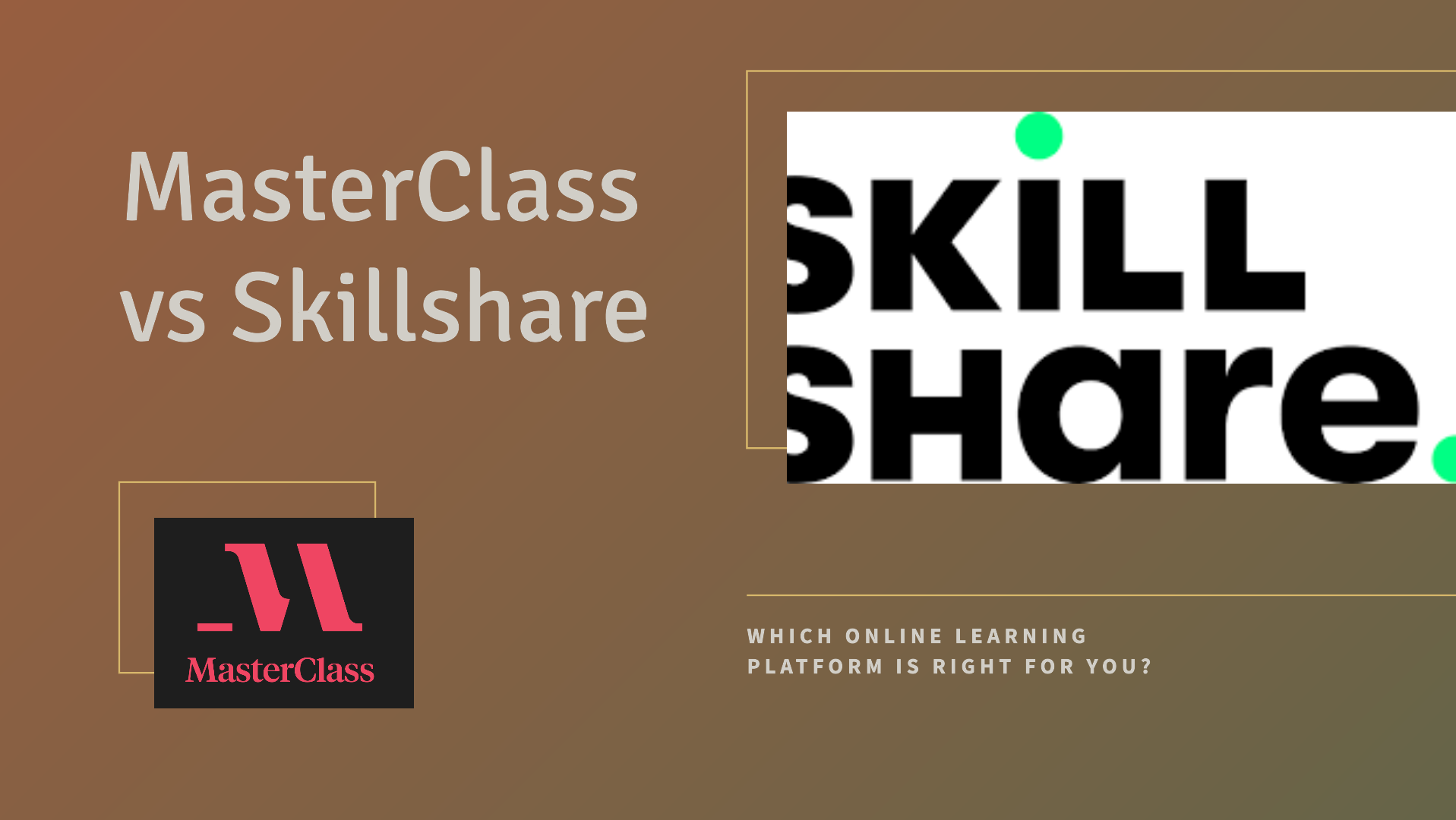In the bustling whirl of our daily lives, finding time for personal growth and learning can seem daunting.
Yet, the rise of online learning platforms like MasterClass and Skillshare has brought the classroom to our fingertips, offering a world of knowledge without the need to leave home. These platforms, each with its own unique charm, cater to diverse learning styles and interests.
This article dives deep into the essence of MasterClass and Skillshare, addressing common queries and helping you decide which platform aligns best with your learning aspirations.
Also read:
About MasterClass
MasterClass is like stepping into a private study with the world’s most renowned figures. Imagine learning storytelling from Neil Gaiman or cooking from Gordon Ramsay. This platform thrives on its star-studded faculty, offering lessons from individuals who have mastered their crafts.

The courses on MasterClass are meticulously produced, resembling high-quality documentaries rather than traditional online classes. This blend of cinematic presentation and expert knowledge creates an immersive learning experience.
MasterClass covers a wide array of subjects, from arts and entertainment to business and politics. Each course typically comprises 20 to 25 video lessons, each lasting around 10 minutes, designed to fit seamlessly into your busy schedule.
The platform operates on a subscription model, charging an annual fee for unlimited access to all classes. While the cost might seem steep, the chance to learn directly from the best can justify the investment for many.
However, MasterClass is not without its drawbacks. The courses, though engaging, often focus more on inspiration than practical, hands-on skills. This approach might leave some learners yearning for more detailed guidance.
Additionally, the subscription model may be a barrier for those who prefer to pay per course or are on a tight budget.

About Skillshare
Skillshare, on the other hand, is a vibrant, community-driven platform that celebrates creativity and lifelong learning. Here, anyone with expertise can become an instructor, which results in a vast and diverse course catalog.
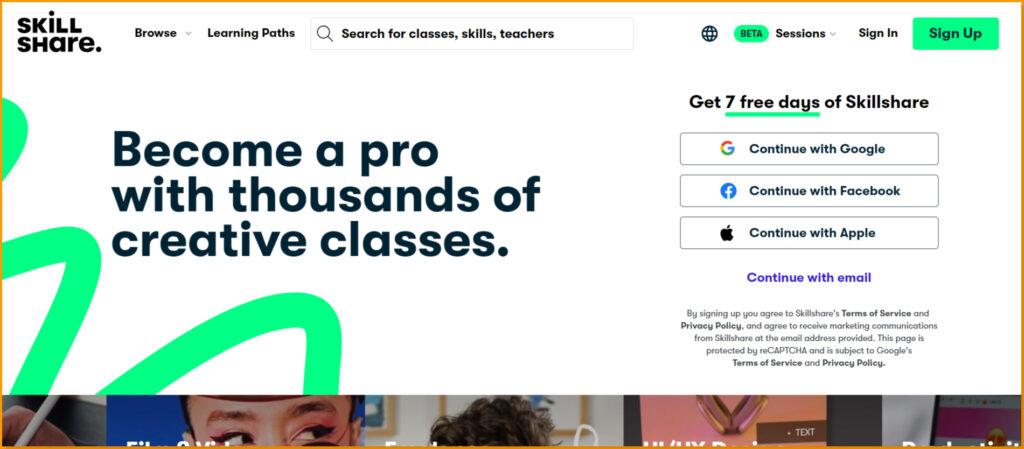
From graphic design and photography to entrepreneurship and lifestyle, Skillshare offers something for everyone. This diversity ensures that learners can explore a multitude of interests without feeling confined to a single subject.
Skillshare’s courses are often shorter and more casual than those on MasterClass, with many focusing on practical skills and project-based learning. This hands-on approach allows learners to apply what they’ve learned immediately, fostering a sense of achievement and progress.
The platform also supports community interaction, enabling students to share their work and receive feedback from peers and instructors.
Skillshare operates on a subscription basis as well but at a lower price point than MasterClass. This affordability makes it accessible to a broader audience.
However, the quality of courses can vary significantly, given the open nature of the platform. While there are many excellent classes, some may lack the polish and depth found on more curated platforms.

Key Differences Between MasterClass and Skillshare
When choosing between MasterClass and Skillshare, it’s essential to consider several factors:
- Teaching Style and Quality of Instructors: MasterClass offers instruction from world-renowned experts, providing insights that are both inspiring and authoritative. Skillshare, with its community-driven approach, offers a more varied teaching style, often focusing on practical, hands-on skills.
- Course Variety and Depth: Skillshare’s extensive catalog covers a broader range of topics, including niche and creative subjects. MasterClass, while offering fewer courses, provides a more in-depth look at each subject, often through the personal experiences of the instructors.
- Learning Experience and Engagement: MasterClass courses are highly produced, providing an engaging, almost cinematic learning experience. Skillshare’s courses are more casual and project-oriented, encouraging active participation and immediate application of skills.
- Community and Peer Interaction: Skillshare fosters a sense of community, with features that allow for peer feedback and interaction. MasterClass, while having a discussion section, does not emphasize community engagement as much.
- Cost-Effectiveness: Skillshare’s lower subscription cost makes it a more budget-friendly option, especially for those who plan to take multiple courses. MasterClass, though more expensive, offers unique value through its high-profile instructors and polished production.
MasterClass vs Skillshare: Pricing Plans
When comparing MasterClass and Skillshare, pricing plans are a crucial factor to consider. Each platform offers different models that cater to various budgets and preferences.
MasterClass Pricing Plans
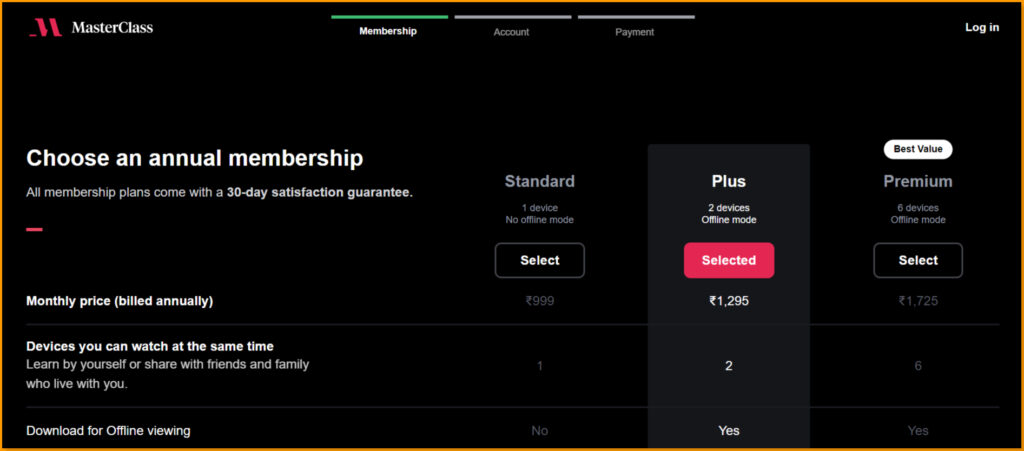
1. Annual Subscription
- Cost: $180 per year
- Access: This plan provides unlimited access to all MasterClass courses for one year. You can explore any subject, from cooking with Gordon Ramsay to writing with Margaret Atwood, without any additional fees.
- Features:
- Unlimited streaming of all courses
- Access to downloadable workbooks and class materials
- No ads during lessons
- Exclusive MasterClass content, including interviews and behind-the-scenes footage
2. Gift Subscriptions
- Cost: $180 per year (same as the standard annual subscription)
- Access: This is essentially the same as the annual subscription but purchased as a gift for someone else.
- Features: Includes the same benefits as the regular annual subscription, allowing the recipient to enjoy full access to all courses and resources.
Discounts and Promotions
- Occasional Discounts: MasterClass sometimes offers promotional discounts, especially around holidays or special events. Keeping an eye on their website or signing up for their newsletter can help you snag these deals.
3. Pricing Summary
- Total Cost: $180 per year
- Best For: Those who are committed to learning from multiple courses and want to explore a variety of subjects over the course of a year.

Skillshare Pricing Plans
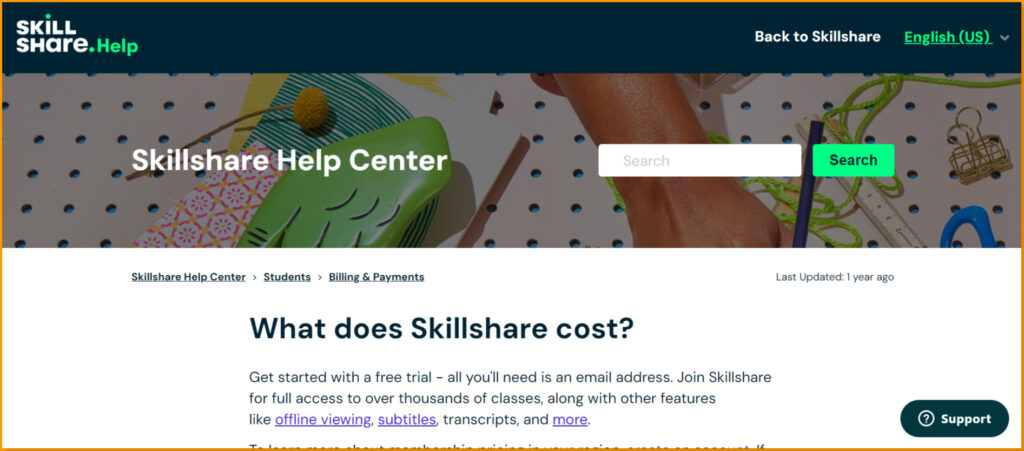
1. Monthly Subscription
- Cost: $32 per month
- Access: This plan allows you to access all of Skillshare’s courses on a month-to-month basis. It’s ideal for those who want flexibility or are interested in taking a few courses without a long-term commitment.
- Features:
- Unlimited access to all classes and resources
- Participation in community projects and discussions
- Ability to save and organize favorite classes
- Skillshare Originals and user-generated content
2. Annual Subscription
- Cost: $168 per year (equates to $14 per month)
- Access: This plan provides the same benefits as the monthly subscription but at a reduced rate if paid annually. It’s a better deal for those who plan to use the platform extensively throughout the year.
- Features: Includes all features of the monthly plan, with the added benefit of a lower cost per month.
3. Free Trial
- Cost: Free (for the first 7 days)
- Access: New users can explore Skillshare’s offerings without any charge for a limited time. This allows you to test out the platform, sample courses, and determine if it meets your learning needs before committing to a paid plan.
- Features: Full access to all courses and features during the trial period.
4. Discounts and Offers
- Promotions: Skillshare frequently offers promotional rates, especially for new users. Discounts can reduce the annual subscription cost even further, making it more affordable for new members.
- Scholarships: Skillshare occasionally provides scholarships or discounted rates for students and educators, making it accessible to a broader audience.
5. Pricing Summary
- Total Cost:
- Monthly: $32 per month
- Annual: $168 per year (approximately $14 per month)
- Best For: Those looking for a flexible, affordable learning option, or those who prefer to pay on a monthly basis. The annual subscription offers significant savings for regular users.

MasterClass vs Skillshare: Key Features
When choosing between MasterClass and Skillshare, understanding the key features each platform offers can help you make an informed decision. Here’s a detailed comparison of their standout attributes:
MasterClass Key Features
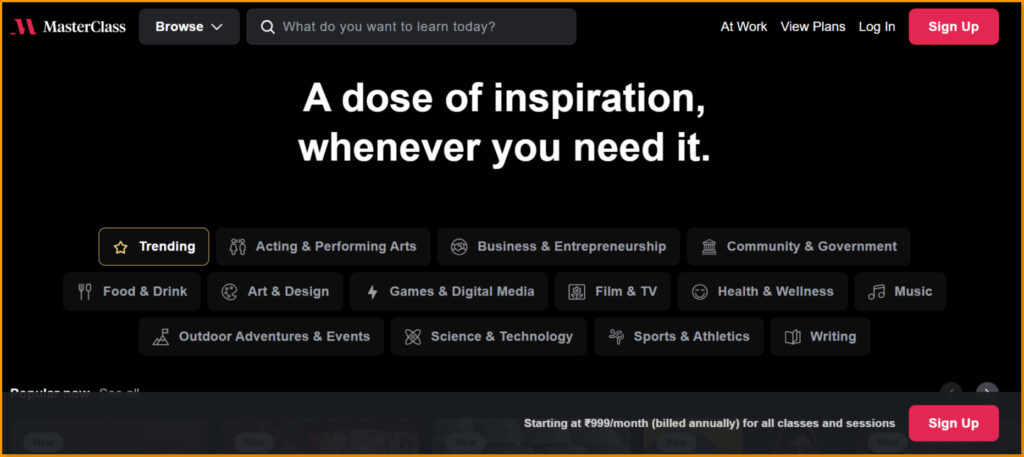
1. World-Class Instructors
- MasterClass is renowned for its roster of celebrity instructors who are leaders in their fields. Learning from figures like Serena Williams, Hans Zimmer, and Martin Scorsese offers a unique opportunity to gain insights from the best.
2. High-Quality Production
- Each course is produced with high cinematic quality, featuring professional filming and editing that make the lessons engaging and visually appealing. This level of production helps to hold the learner’s attention and enhances the overall learning experience.
3. In-Depth Courses
- Courses on MasterClass are comprehensive, often including 20 to 25 video lessons, each around 10 minutes long. These lessons delve deeply into the subject matter, providing a thorough understanding through a blend of theoretical knowledge and personal anecdotes.
4. Downloadable Workbooks
- Each course comes with a downloadable workbook that includes lesson summaries, assignments, and additional resources to reinforce learning and provide practical applications.
5. No Ads
- MasterClass offers an uninterrupted learning experience with no advertisements, ensuring that learners can focus solely on the content.
Skillshare Key Features
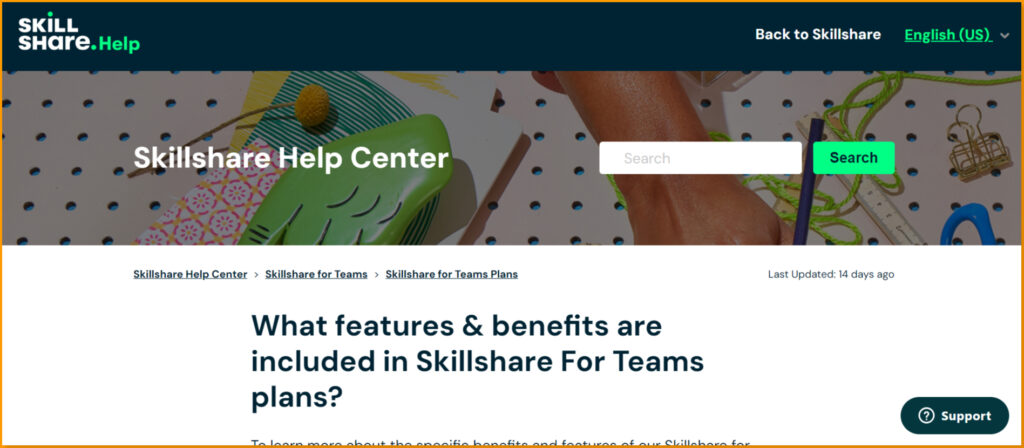
1. Community-Driven Content
- Skillshare’s open platform allows anyone with expertise to create and share courses. This community-driven approach results in a vast and diverse catalog of classes across various subjects, catering to a wide range of interests and skill levels.
2. Project-Based Learning
- Many Skillshare courses are designed around projects that students complete as they progress through the lessons. This hands-on approach helps learners apply new skills immediately and see tangible results.
3. Affordability
- Skillshare offers competitive pricing with both monthly and annual subscription plans, as well as a free trial period. This makes it an accessible option for those on a budget or looking to explore multiple courses.
4. Short and Flexible Classes
- Skillshare’s classes are typically shorter and more flexible, allowing learners to fit lessons into their schedules easily. This format is ideal for busy individuals who prefer to learn in shorter bursts.
5. Active Community and Feedback
- The platform encourages interaction through discussion boards, class projects, and peer reviews. This sense of community not only fosters a supportive learning environment but also provides opportunities for feedback and collaboration.
6. Access to Skillshare Originals
- In addition to user-generated content, Skillshare produces its own exclusive courses called Skillshare Originals, which are created with high production values and taught by industry professionals.
Comparing Key Features
Teaching Quality
- MasterClass: Offers unparalleled instruction from globally recognized experts.
- Skillshare: Provides diverse teaching styles from a wide range of instructors, including professionals and hobbyists.
Course Variety
- MasterClass: Focuses on fewer subjects but with in-depth content.
- Skillshare: Covers a broad spectrum of topics, including niche and creative areas.
Learning Experience
- MasterClass: Features high-quality, engaging, and well-produced lessons.
- Skillshare: Emphasizes practical, project-based learning with community interaction.
Flexibility and Accessibility
- MasterClass: Requires an annual subscription, with all courses included.
- Skillshare: Offers flexible pricing plans and a free trial, making it accessible to more learners.
Community and Support
- MasterClass: Limited community interaction but strong support through a help center and email.
- Skillshare: Active community engagement with robust support and feedback mechanisms.
By examining these key features, you can determine which platform aligns best with your personal learning style, interests, and goals. Whether you’re inspired by the thought of learning from icons in their fields on MasterClass or eager to dive into hands-on projects with a supportive community on Skillshare, each platform offers unique benefits to enhance your educational journey.
Who Should Choose MasterClass?
MasterClass is ideal for individuals who seek inspiration and insights from the world’s leading experts. If you’re someone who enjoys learning through storytelling and appreciates high-quality production, MasterClass will likely resonate with you.
For instance, a budding writer might find immense value in a course by Margaret Atwood, where she not only shares writing techniques but also personal anecdotes that offer a glimpse into her creative process.
Consider John, an aspiring chef who dreams of opening his own restaurant. Watching Gordon Ramsay’s MasterClass, John gains more than just cooking tips; he learns about the passion, dedication, and hard work required to succeed in the culinary world.
This blend of practical advice and motivational storytelling helps John stay inspired and focused on his goals.

Who Should Opt for Skillshare?
Skillshare is perfect for learners who thrive on hands-on projects and enjoy exploring a wide range of topics. If you’re looking for practical skills that you can apply immediately, or if you’re on a budget, Skillshare is an excellent choice.
Take Sarah, for example, a graphic designer who wants to expand her skills in illustration. On Skillshare, she finds numerous courses that teach specific techniques and styles, allowing her to experiment and grow her portfolio quickly.
Another example is Mark, an entrepreneur looking to improve his marketing skills. Skillshare’s variety of courses in business and marketing provide him with practical strategies he can implement right away.
The community aspect of Skillshare also allows Mark to share his progress and get feedback, making the learning experience more interactive and supportive.
MasterClass vs Skillshare: Pros and Cons
To make an informed decision, it’s helpful to weigh the pros and cons of each platform. Both MasterClass and Skillshare have their unique strengths and areas for improvement.
MasterClass Pros
- High-Quality Production: The video lessons are professionally produced, offering an engaging and immersive viewing experience.
- Expert Instructors: Courses are taught by world-renowned experts, providing insights and inspiration from the best in their fields.
- In-Depth Content: Each course offers a deep dive into the subject matter, often through personal anecdotes and experiences of the instructors.
MasterClass Cons
- Cost: The annual subscription fee can be a significant upfront investment.
- Limited Practical Skills: Courses tend to focus more on theory and inspiration rather than hands-on, practical skills.
- Less Community Interaction: Compared to other platforms, MasterClass has fewer opportunities for peer interaction and feedback.
Skillshare Pros
- Diverse Course Catalog: With a wide range of topics, there’s something for everyone, from creative arts to business and technology.
- Affordable Pricing: The monthly and annual subscription options are more budget-friendly, and the free trial allows you to test the platform.
- Project-Based Learning: Many courses focus on practical, hands-on skills, allowing learners to apply what they’ve learned immediately.
Skillshare Cons
- Variable Quality: Since anyone can become an instructor, the quality of courses can vary significantly.
- Less Polished Production: Compared to MasterClass, Skillshare’s video lessons are generally less polished and professional.
- Subscription Model: While affordable, the subscription model might not appeal to those who prefer paying per course.
MasterClass vs Skillshare: Customer Support
Quality customer support is an essential aspect of any online learning platform, ensuring that users have a smooth and positive experience.
MasterClass Customer Support
MasterClass offers a comprehensive help center with articles and FAQs to address common issues and questions. If you need further assistance, you can reach out to their support team via email.
While MasterClass doesn’t offer live chat or phone support, their email response time is generally prompt, and they strive to resolve issues efficiently.
Additionally, the platform provides a community section where users can discuss courses and share experiences, although it’s not as interactive as Skillshare’s community features.
Skillshare Customer Support
Skillshare also provides a robust help center with articles, tutorials, and FAQs. For direct assistance, you can contact their support team via email. Skillshare’s customer support is known for being responsive and helpful.
Moreover, the platform fosters a strong sense of community through discussion boards, class projects, and group challenges, allowing users to interact, share feedback, and support each other. This community aspect enhances the overall learning experience, making it easier to find answers and connect with fellow learners.
Conclusion: MasterClass vs Skillshare
In the grand tapestry of online learning, MasterClass and Skillshare each weave their own unique threads. MasterClass offers a window into the minds of the world’s greatest experts, providing inspiration and insight that can ignite your passion and drive.
Skillshare, with its diverse and practical approach, empowers learners to dive into new skills and apply them immediately, fostering a sense of community and creativity.
Choosing between these two platforms ultimately depends on your learning style, interests, and budget.
If you seek inspiration from the masters and enjoy a well-produced, immersive experience, MasterClass might be your perfect match. On the other hand, if you prefer practical, hands-on learning and a community-driven environment, Skillshare will likely meet your needs.


